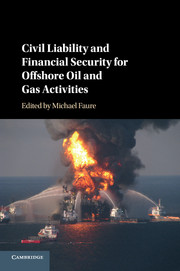Book contents
- Frontmatter
- Contents
- List of Figures and Tables
- List of Contributors
- Preface and Acknowledgements
- List of Abbreviations
- 1 Introduction
- 2 Offshore-Related Damage: Facts and Figures
- 3 Analysis of Existing Legal Regimes
- 4 Pooling Mechanisms for Offshore Liability
- 5 The Use of Financial Market Instruments to Cover Liability Following a Major Offshore Accident
- 6 Potential of Financial and Insurance Instruments to Cover Liability Following a Major Offshore Accident
- 7 Towards Optimal Liability and Compensation for Offshore Oil and Gas Activities
- 8 Concluding Remarks
- References
- Appendix 1 Overview of Interviews with Stakeholders
- Appendix 2 Checklist for Country Studies
- Appendix 3 Oil Pollution Act Liability Limits, 2012
- Index
7 - Towards Optimal Liability and Compensation for Offshore Oil and Gas Activities
Published online by Cambridge University Press: 20 October 2016
- Frontmatter
- Contents
- List of Figures and Tables
- List of Contributors
- Preface and Acknowledgements
- List of Abbreviations
- 1 Introduction
- 2 Offshore-Related Damage: Facts and Figures
- 3 Analysis of Existing Legal Regimes
- 4 Pooling Mechanisms for Offshore Liability
- 5 The Use of Financial Market Instruments to Cover Liability Following a Major Offshore Accident
- 6 Potential of Financial and Insurance Instruments to Cover Liability Following a Major Offshore Accident
- 7 Towards Optimal Liability and Compensation for Offshore Oil and Gas Activities
- 8 Concluding Remarks
- References
- Appendix 1 Overview of Interviews with Stakeholders
- Appendix 2 Checklist for Country Studies
- Appendix 3 Oil Pollution Act Liability Limits, 2012
- Index
Summary
In this chapter, we will take into account the findings from previous chapters: not only the potential of financial and insurance instruments to cover a future liability regime (Chapter 6) but also an analysis of the existing legal regimes (Chapter 3) and an analysis of existing risk-pooling mechanisms (Chapter 4). The ultimate goal is obviously to improve decision making and to inform the recommendations which will be formulated as concluding remarks in the Chapter 8. In order to construct these scenarios in an informed manner, insights from economic analysis of law will be used to critically review potential options that will later be analyzed in detail. These will be based, as mentioned, on economic theory. However, they will take into account best practices (and problems) because they follow from examples such as in the compensation regime for vessel-based pollution but also from the liability and compensation regime in other high-risk sectors such as nuclear energy.
Hence, this chapter will start by sketching some principles of optimal liability rules and efficient compensation mechanisms, which will constitute the methodological basis (7.1). Next, principles of efficient liability rules will be examined and applied to the offshore sector (7.2). In this respect, the question will be asked what the optimal liability rule (negligence or strict liability) would be in the case of damage resulting from an offshore incident and how liability should be attributed, more particularly in the case where multiple tortfeasors are involved (channelling of liability, joint and several liability, etc.).
An important issue in the determination of efficient liability rules also concerns the damages and more particularly the question of whether a financial cap or limit on the amount of damages would be indicated. Attention equally will be paid to the important question of the relationship between liability and regulation. To an important extent, this may limit or expand the potential liability and, taking into account regulatory requirements, also could enlighten the task of the judge in a liability case. Hence, the relationship between safety regulation and liability in the case of offshore installations should be carefully reviewed (7.3).
- Type
- Chapter
- Information
- Publisher: Cambridge University PressPrint publication year: 2016



